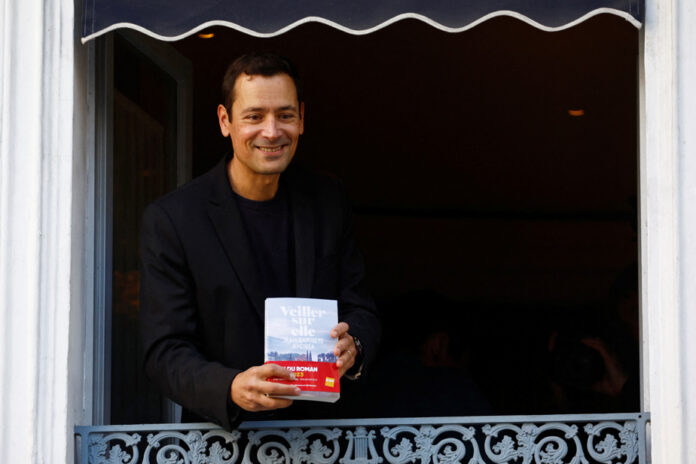(Paris) Jean-Baptiste Andrea won the Goncourt on Tuesday for Veiller sur elle, a fresco of more than 500 pages which combines the history of Italy in the 20th century, thwarted love and passion for art, published by a small publishing house, L’iconoclaste.
The 52-year-old novelist was elected in the 14th round, proof of the dissensions within the jury chaired by Didier Decoin, whose vote counts double at the end.
For the most prestigious French-speaking literary prize, he faced Eric Reinhardt, long considered a favorite, Gaspard Kœnig and Neige Sinno, awarded the Femina prize on Monday.
“It’s an extraordinary moment and I didn’t think I’d experience that once in my life,” exclaimed Jean-Baptiste Andrea, near Drouant, the restaurant where the Goncourt has traditionally been awarded since 1914, at lunch.
“I think of all the kids who dream of it, and who say to themselves: I won’t make it. I want to tell them: be unreasonable.” “Art is freedom. I have always believed in romance, romance has never died,” he added, before paying tribute to his editor Sophie de Sivry, who died in May.
Veiller sur elle is the fourth novel by Jean-Baptiste Andrea, who took his first steps in cinema before devoting himself late to literature, six years ago. This fresco, on sculpture and Italy, had already received the Fnac prize at the end of August.
Mimo, born poor and apprenticed to a mediocre sculptor, recounts his journey and his love story with Viola Orsini, ambitious heiress to a prestigious family, in the midst of Italy’s fall into fascism.
The Goncourt prize is the assurance of considerable sales during the last two months of the year, the most important for booksellers. They reach an average of around 400,000 copies. Jean-Baptiste Andrea has already reached more than 50,000, a good start.
Goncourt 2022, Vivre vite by Brigitte Giraud, disappointed from this point of view, remaining below 300,000 copies.
She had only been nominated in the very last round, too. And the most influential publisher of French letters, Gallimard, had already been beaten at the last minute.
Immediately after the Goncourt, and also at the Drouant restaurant, the Renaudot jury announced its 2023 prize, awarded to Ann Scott, 58, for Les insolents (Calmann-Lévy editions).
The novel tells of the arrival “in the middle of nowhere” of Alex, a film music composer who decides to leave the capital to reinvent herself, wishing to live “elsewhere and alone”. The character is a fictional double of the author, a former queen of Parisian nights based in Brittany.
Born to a Russian photographer mother and a French art collector father, Ann Scott grew up in Paris before moving to London at 17. She was a model and a drummer in a punk band.
The author of Asphyxia and Superstar, who started writing at the age of 29, paid tribute to the memory of her father. “That’s what he hoped for me. Now he’s up there. And maybe he wanted it,” she told AFP.
Prime Minister Elisabeth Borne greeted the winners of these two prizes. “One traces the experience of love, the other of solitude; these two works invite us to think about the world around us. That’s the power of literature,” she wrote on X.
The Renaudot prize for the essay was awarded to Jean-Luc Barré for the first volume, in more than 900 pages, of an immense biography: De Gaulle, une vie: l’homme de Personne (1890-1944), aux Grasset editions.
The Renaudot prize for paperback went to Manuel Carcassonne for The Reversal.















